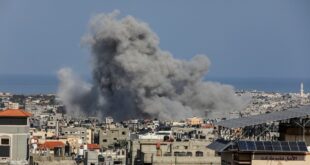RD Interview: Professor Emeritus of Columbia University Robert Legvold argues that Russia and the U.S. are in the second phase of a new Cold War that has the potential to exacerbate the situation in Syria and become another missed opportunity for cooperation.
Russia and the United States are moving into the second phase of a new Cold War, one where they accept hostility and confrontation as the new normal. This promises more problems than solutions. The two countries are “not in a good place,” said Robert Legvold, professor emeritus of Columbia University, during a Carnegie Moscow Center discussion on Sept. 22.
“We are learning to live with what is effectively a new Cold War—different as it is from the original Cold War—and neither side expects much to change any time soon,” he said.
In the process, Legvold argues, U.S.-Russia relations “are losing the guidance or limits developed during the original Cold War,” when some kinds of rules existed. In addition, there is little respect for one another. Mutual disrespect, unlike during the original Cold War, marks relations today.
Syria and the fight against the Islamic State of Iraq and the Greater Syria (ISIS) are going to be added to the long list of missed opportunities for U.S.-Russia bilateral cooperation, he told Russia Direct in an interview.According to Legvold, neither U.S. nor Russian foreign policy is guided by longer-range strategic thinking. Neither appears to have either the ability or inclination to integrate short-term policy with long-run goals. Nor are new rules for conducting their intensified competition likely to emerge until, alas, events force them into being. In this respect, thederailing of U.S.-Russian relations is more dangerous than the original Cold War.
He also discusses the odds of a clash between Russia and the U.S. in the Middle East as well as the reasons why Russia should be more active in contributing to the Syrian refugee crisis in Europe.
Russia Direct: There are numerous reports that Russia is going to increase its troops in Syria. In addition, Kremlin spokesperson Dmitri Peskov says that Moscow is ready to provide military assistance to Syrian President Bashar Assad to fight ISIS. Amidst these events, what are the chances that Russia and the U.S. find common ground in Syria?
Robert Legvold: The Syrian crisis is a good illustration of what I call a new U.S.-Russia Cold War. In principle, the two countries should find common ground: Both Russia and the United States have a strong interest in fighting ISIS and destroying that force within Iraq and Syria. But the United States is opposing the Assad regime, insisting that his exit is the prerequisite for a political settlement, while the Russian side is supporting Assad. When Russia provides military assistance in Latakia and Tartus, the U.S. has worked to block it.
RATHER THAN SEEING RUSSIAN ASSISTANCE TO THE SYRIAN SIDE AS, IN PART, RUSSIA’S CONTRIBUTION TO THE WAR AGAINST ISIS, WASHINGTON VIEWS IT AS FUELING THE CIVIL WAR AND INTENSIFYING THE MIGRATION CRISIS
– Robert Legvold, Columbia University
Hence, rather than seeing Russian assistance to the Syrian side as, in part, Russia’s contribution to the war against ISIS, Washington views it as fueling the civil war and intensifying the migration crisis. In the absence of progress toward a political settlement of the Syrian civil war, the two sides will find it very difficult to find a way to cooperate in the war against ISIS.
RD: So, what is going to happen in the future?
R.L.: The Russians have now said that they are supplying by air and by sea Syria’s armed forces, building up a new base in Latakia that will accommodate 1,500 troops. More than 200 marines have been deployed. They are beginning to introduce more advanced armament, such as the BTR-82A armored personnel carrier.
So, the U.S. is opposing that. It tries to deny it by blocking air space, successfully in the case of Bulgaria. But they are not likely to succeed in blocking Iraqi or Iranian airspace, which Russia uses as a way to bring assistance in.
I don’t think the U.S. will go beyond that. But in the context of the new Cold War there will be implications for bilateral relations. The effect will be an increasingly negative attitude of Washington and the Obama administration towards Russian President Vladimir Putin.
And, in the meantime, the Russian side is going to see the U.S. as a country sticking to an anti-Russian policy, a policy designed to pursue U.S. strategic interests in the region in the way that is destabilizing and creating problems within the Middle East.
RD: How do you assess the odds of Russian and American soldiers clashing in Syria, as some warn?
R.L.: There is a small risk. However, something like a military encounter could happen. If it happens, it would be because the area — where the fighting is taking place— is, basically, a very narrow strip in the western part of Syria between various opposition forces and Syria’s armed forces.
In addition, there is a very large part of neighboring territory controlled by ISIS. If the United States bombs in the areas that are very close to Latakia, where the Russians are operating, there might be some risks: American air forces could attack where Russian advisors and soldiers are present. That would be fairly unlikely, but it can’t be ruled out. This is likely one of the key subjects in the new direct talks between Secretary of Defense Ashton Carter and Russian Defense Minister Sergey Shoigu.
RD: It seems to have stemmed from that fact that Russia and America are going to create two different coalitions to fight the Islamic State. So, why don’t Moscow and Washington team up to fight ISIS?
R.L.: On Monday at the UN, President Putin is expected to propose a Grand Coalition to fight ISIS, one that includes all the major players, including Iran. In that form, the idea is almost certainly going to be unacceptable to the Obama Administration. The key question is whether Washington will feel there is enough in Putin’s initiative that warrants engaging Moscow in the search for a workable common position.
Even then, however, as I said, the obstacle posed by the absence of progress toward a political settlement or mitigation of the Syrian civil war will make cooperation difficult. And progress toward a political settlement will not begin until the United States abandons Assad going as a precondition and Russia abandons its unconditional support for the Assad regime.
R.L.: It is very unlikely that Russia will begin receiving the flows of migrants that are coming out of Syria and North Africa. But it is the responsibility of most of the major developed countries, not only in Western Europe, but also, my country, the United States, which agreed to take a small number of refugees: 10,000.
As a matter of ethics and principles, it would be very good if Russia were able to assist what in reality is an international migration crisis. It is not just a Western European crisis, it is a human crisis; and any country that is able to assist should.
RD: To what extent could Russia’s contribution to alleviating the Syrian refugees crisis be a game-changer in improving its image abroad?
R.L.: Given that Russia is viewed negatively by much of the outside world, her contribution to mitigating this human tragedy, the European migration crisis, cannot help but have a positive effect on Russia’s image. Still, the sources and nature of this negative image are large enough that it will not turn around tomorrow.
Author: Pavel Koshkin
 Geostrategic Media Political Commentary, Analysis, Security, Defense
Geostrategic Media Political Commentary, Analysis, Security, Defense





